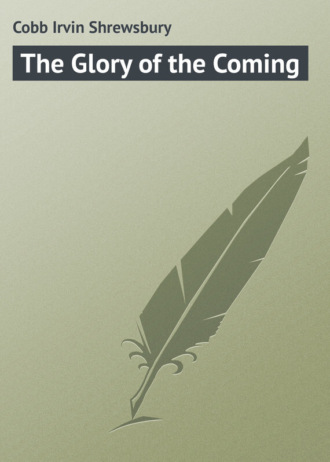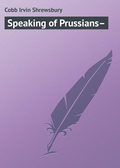
Cobb Irvin Shrewsbury
The Glory of the Coming
“Well, what sort of a show did you put on last night?” one of us inquired as we entered.
“Oh, a priceless show,” came the answer from one. “We gave the dear old Boche a sultry evenin’ and make no ruddy error about it. Spilt our little pills all over Mannheim and Treves. Scored a lot of direct hits too, as well as one might judge while comin’ away in more or less of a hurry.”
“It was rippin’ fun while it lasted,” put in another. “We didn’t get back though until nearly four o’clock this mornin’. It left me feel-in’ rather seedy – I must have my beauty sleep or I’m no good for the whole day.” Behind his hand he yawned.
Now ordinarily, the next question would have been framed with a view to finding out whether all the bombers had safely returned; but the airman’s code of ethics forbade. It was perfectly proper to inquire regarding the effects of a raid into hostile territory but the outsider must refrain from seeking information regarding any losses on the part of the raiders until one of them volunteered the news of his own accord.
But there was no rule against our silently counting noses and this we did, industriously. As nearly as I could make out there were, of those whom we knew had participated in the expedition, five or six missing from the assembled company; but then of course the absentees might be asleep in their quarters.
It struck the three of us, and in my own case I know the impression deepened as the minutes passed, that for all their kindly hospitality and all their solicitude that we should feel at home, there was a common depression prevalent among them. Some, we thought betrayed their feelings by a silence not habitual among these high-spirited youths.. Some seemed abstracted and some just a trifle irritable. And when this one or that described the bombing of the enemy towns which had been their particular targets I was sure I detected something forced about the enthusiasm he out into his speech.
Presently there befell one of those awkward little silences which inevitably occur in any gathering where the spirit of things is a bit forced and strained. It was broken by a lanky twenty-year-old flyer.
“Hm – ” he began, clearing his throat and striving to make his tone casual, “you know, Wilkins and his observer didn’t get back.” That was all – no details of how his two mates had gone rocketing down somewhere behind the German lines probably to instant death. In these few words he stated the bald fact of it and then he looked away, suddenly and unduly interested in the movements of somebody passing by one of the open windows.
On my right hand sat that winning little chap whom his mates called the Young-’Un. The Young-’Un was lighting a pipe.
“Beastly annoyin’,” he grunted between puffs at the stem of his briar-root, “losin’ Wilkins. As a matter of fact he was the only decent pianist we had. Rotten luck and all that sort of thing to lose our pianist, eh what?” Coming from the Young-’Un, with his gentle smile and his soft whimsical drawl, the last remark seemed so utterly unsympathetic, so callous, so cold-blooded, that the shock of what he said left me mute. It left my two companions mute, too.
I turned in my chair and looked at the Young-’Un. He seemed to have trouble getting his pipe going. His two hands were cupped over the bowl, making a mask for his face. By reason of his hands I could not see much of his face but I could see this much – that his chin was trembling, that the big muscles in his throat were twitching and jumping and that though he winked his eyes as fast as he could, he couldn’t wink fast enough to keep the big tears from leaking out and running down his cheeks.
Because he was an experienced airman it was a part of his professional code to make no pother over the loss of a fellow-flier by the hazard of chance which every one of them dared as a part of his daily life. Because he was an Englishman, he felt shame that he should show any emotion. But because his heart was broken he cried behind the cover of his hands.
Shells and bombs are forever doing freakish things. The effects of their tantrums set one to thinking of the conduct of cyclones and earthquakes. For example:
In Bar-le-Duc, which most Americans used to think of, not as a city but as a kind of jelly, I saw when we passed through there the other day, where a bomb dropped by a German airraider did a curious bit of damage. I reckon people who believe in omens and portents would call it significant. Just off the railroad station in a little paved square stands a monument put up by popular subscription to the men of this town who died for their country in 1870-71. Upon one face of the granite shaft, being the one which looks inward toward the town, are two bronze figures of heroic size. The lowermost figure is that of a dying boy-soldier, with one hand pressed to his breast and the other holding fast to his musket. The other figure – that of a winged angel typifying the spirit of France – is hovering above him with a palm branch extended over his drooping head.
The bomb, descending from on high, must have grazed the face of the monument. A great hole in the pavement shows where it exploded. One flying fragment sheared away the fingers and thumbs of the dying soldier’s hand so that the bronze musket was tom out of his grasp and flung upon the earth. Some one picked up the musket and laid it at the base of the marble but the hand sticks out into space empty and mutilated.
I dare say a German might interpret this as meaning France would be left crippled, disarmed and mangled. But to me I read it as a sign to show that France, the conqueror, and not the conquered, will be one of the nations that are to take the lead in bringing about universal peace and universal disarmament, once Germany has been cused of what ails her.
I saw them when they first landed at Camp Upton – furtive, frightened, slew-footed, slackshouldered, underfed, apprehensive – a huddle of unhappy aliens speaking in alien tongues; knowing little of the cause for which they must fight and possibly caring less.
I saw them again three months later when the snow of the dreadful winter of 1917-18 was piling high about their wooden barracks down there on wind-swept Long Island. The stoop was beginning to come out of their spines, the shamble out of their gait. They had learned to hold their heads up, had learned to look every man in the eye and tell him to go elsewhere with a capital H. They knew now that discipline was not punishment and that the salute was not a mark of servility but an evidence of mutual self-respect as between officer and man. They wore their uniforms with pride. The flag meant something to them and the war meant something to them. Three short hard months of training had transformed them from a rabble into soldier-stuff; from a street-mob into the makings of an army; from strangers into Americans.
After nine months I have seen them once more in France. For swagger, for snap, for smartness in the drill and for cockiness in the billet; for good humour on the march and for dash and spunk and deviltry in the fighting into which just now they have been sent, our army can show no better soldiers and no more gallant spirits than the lads who mainly make up the rank and file of this particular division.
They are the foreign-born Jews and Italians and Slavs of New York’s East Side, that were called up for service in the first draft.
No wonder the mother who didn’t raise her boy to be a soldier has become an extinct species back home.






